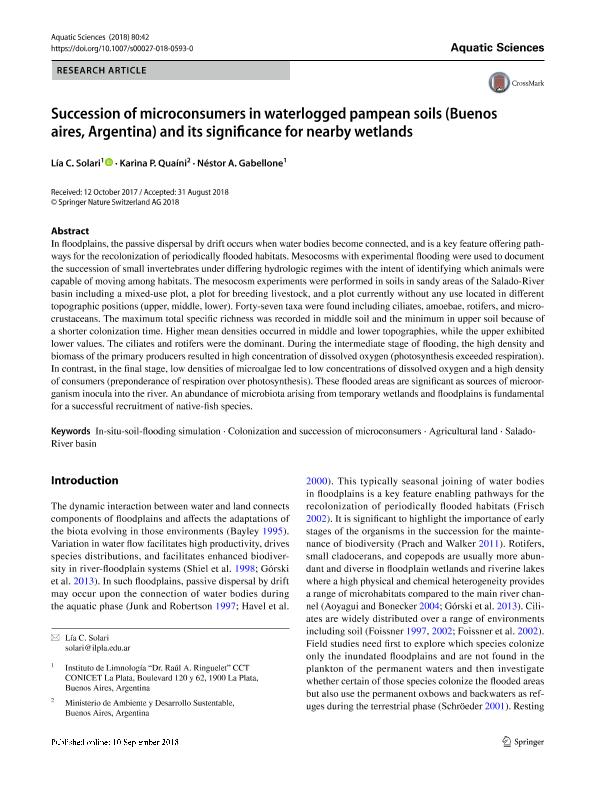Artículo
Succession of microconsumers in waterlogged pampean soils (Buenos aires, Argentina) and its significance for nearby wetlands
Fecha de publicación:
10/2018
Editorial:
Birkhauser Verlag Ag
Revista:
Aquatic Sciences
ISSN:
1015-1621
Idioma:
Inglés
Tipo de recurso:
Artículo publicado
Clasificación temática:
Resumen
In floodplains, the passive dispersal by drift occurs when water bodies become connected, and is a key feature offering pathways for the recolonization of periodically flooded habitats. Mesocosms with experimental flooding were used to document the succession of small invertebrates under differing hydrologic regimes with the intent of identifying which animals were capable of moving among habitats. The mesocosm experiments were performed in soils in sandy areas of the Salado-River basin including a mixed-use plot, a plot for breeding livestock, and a plot currently without any use located in different topographic positions (upper, middle, lower). Forty-seven taxa were found including ciliates, amoebae, rotifers, and microcrustaceans. The maximum total specific richness was recorded in middle soil and the minimum in upper soil because of a shorter colonization time. Higher mean densities occurred in middle and lower topographies, while the upper exhibited lower values. The ciliates and rotifers were the dominant. During the intermediate stage of flooding, the high density and biomass of the primary producers resulted in high concentration of dissolved oxygen (photosynthesis exceeded respiration). In contrast, in the final stage, low densities of microalgae led to low concentrations of dissolved oxygen and a high density of consumers (preponderance of respiration over photosynthesis). These flooded areas are significant as sources of microorganism inocula into the river. An abundance of microbiota arising from temporary wetlands and floodplains is fundamental for a successful recruitment of native-fish species.
Archivos asociados
Licencia
Identificadores
Colecciones
Articulos(ILPLA)
Articulos de INST.DE LIMNOLOGIA "DR. RAUL A. RINGUELET"
Articulos de INST.DE LIMNOLOGIA "DR. RAUL A. RINGUELET"
Citación
Solari, Lía Cristina; Quaini, Karina Paola; Gabellone, Nestor Adrian; Succession of microconsumers in waterlogged pampean soils (Buenos aires, Argentina) and its significance for nearby wetlands; Birkhauser Verlag Ag; Aquatic Sciences; 80; 4; 10-2018
Compartir
Altmétricas




